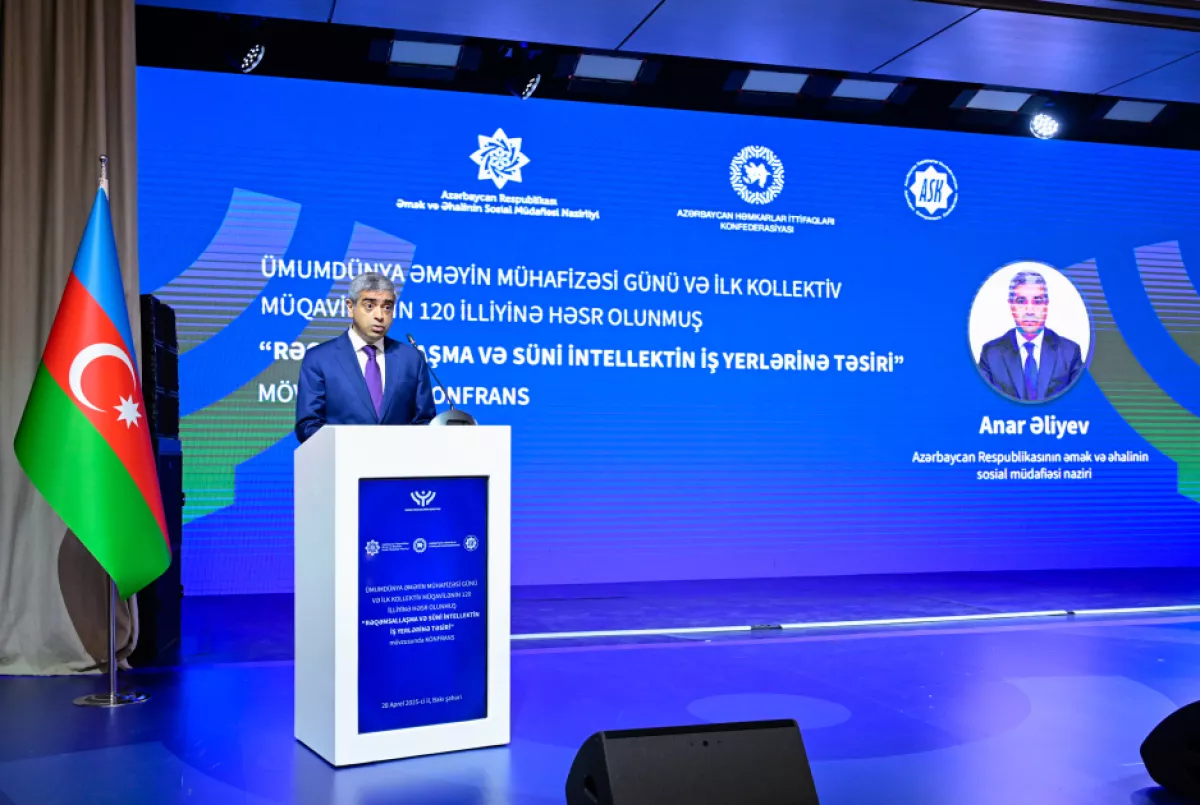Artificial intelligence and Azerbaijan’s labour market Impact of AI and digitalisation on jobs
According to experts from the United Nations and the International Labour Organisation (ILO), the global labour market has faced significant challenges due to the post-pandemic energy crisis, hyperinflation, recession, climate change, trade wars, and mounting debt. More recently, the rapid advance of digitalisation and the rise of artificial intelligence (AI) have further disrupted employment worldwide.
In response to these developments, Azerbaijan has launched wide-ranging social reforms and initiated a digital transformation of its economy to mitigate the negative impacts. These issues were the focus of a recent conference held at the "Gulistan" Palace in Baku, titled "Impact of Digitalisation and Artificial Intelligence on Jobs."
ILO specialists believe that the disruption of the global economy over the past four years has affected even previously prosperous countries, where production came to a halt and labour markets contracted. It is quite evident that these negative trends have also impacted many developing nations, including those in the post-Soviet region. According to ILO estimates, the total number of unemployed people in 2024 exceeded 402 million. By comparison, in the relatively stable pre-crisis year of 2019, the global unemployment figure stood at 186 million, meaning that the situation in this area has more than doubled in severity over the past five years. At the same time, the number of workers employed in the informal sector—without official registration or social protections—has increased from 1.7 billion in 2005 to over 2 billion in 2024.

The current labour market situation, forecasts, and emerging risks are increasingly being discussed by the United Nations, with much of the analysis published in connection with the annual observance of World Day for Safety and Health at Work on April 28. This year, the ILO focused on the risks and new opportunities arising from widespread digitalisation and the introduction of artificial intelligence, which are radically transforming the labour market and introducing new requirements for worker protection.
According to the ILO, “smart” technologies—various bots and the increasing robotisation of production processes—help to secure hazardous industrial operations and automate repetitive, routine tasks. Virtual reality enables the management of business processes and staff training without risk; wearable gadgets monitor workers’ health in real time; and AI-powered analytics systems can predict danger before it results in an accident.
At the same time, many countries lack systems for continuous training in new technologies, and there are age, gender, and other gaps that hinder worker adaptation to innovation. Finally, the absence of a clear regulatory framework, along with the real threat of human labour being replaced through automation, puts considerable pressure on labour market participants.
According to The Banker, banks around the world are already beginning to cut staff as they adopt artificial intelligence. For instance, Singapore’s DBS and Italy’s Intesa Sanpaolo have each announced plans to reduce their workforce by 10%. It is projected that over the next five years, up to 200,000 banking jobs will be replaced by AI. Similar trends are expected to gradually affect other segments of the financial sector, including insurance, leasing, processing, and more.

In its recent report “Technology and Innovation Report 2025”, the United Nations Conference on Trade and Development (UNCTAD) notes that despite the enormous potential of artificial intelligence, its development does not guarantee inclusivity without significant investment in digital infrastructure, skills enhancement, human capital development, and stronger governance and legal frameworks for AI regulation.
The global AI market is expected to reach $500 billion by the end of 2025, and according to UNCTAD forecasts, it could grow to $4.8 trillion by 2033—making it one of the main driving forces of digital transformation. However, access to AI infrastructure and expertise remains concentrated in a handful of countries. Just 100 companies—primarily based in the United States and China—account for 40% of global corporate spending on research and technological development.
Major tech giants like Apple, Nvidia, and Microsoft are each valued at $3 trillion—comparable to the combined GDP of the entire African continent. This level of market dominance is widening the technological divide, leaving many developing countries unable to benefit from the advantages of AI.
“Artificial intelligence and digitalisation offer vast opportunities for improving workplace safety and enhancing risk monitoring productivity. However, it is widely acknowledged that these technologies also raise serious concerns: without careful and ethical implementation, tools such as employee surveillance and algorithmic management can threaten workers’ rights, personal freedom, and well-being,” said ILO Director-General Gilbert Houngbo in a video message to participants of the Baku conference “Impact of Digitalization and Artificial Intelligence on Jobs”, held in honour of World Day for Safety and Health at Work and the 120th anniversary of the first collective agreement.
The ILO chief called for expanding the use of technological innovation while simultaneously reinforcing conservative, inclusive, and decent working conditions for all. A similar message was delivered by General Secretary of the International Trade Union Confederation (ITUC), Luc Triangle, who stated: “There are numerous regulatory gaps in worker protection, especially in industries where technologies are advancing under a ‘race to the bottom’ model.”
What is being done in Azerbaijan to minimise the global negative impacts and enhance social protection for workers? How is the implementation of advanced technological trends progressing, while also safeguarding the interests of local labour market participants in the rapidly changing conditions of the Fourth Industrial Revolution?
“As a result of the targeted social policy of President Ilham Aliyev, five major packages of social reforms were implemented in the country between 2018 and 2025. The annual additional financial volume of these reforms amounted to 7.6 billion manat ($4.5 billion), benefiting 4 million people,” stated Azerbaijan's Minister of Labour and Social Protection of the Population, Anar Aliyev, during his speech at the conference. “Today, work is underway on about 200 amendments to the Labour Code, most of which relate to the organisation of remote work, the introduction of an hourly wage system, equal pay for work of equal value, the elimination of gender discrimination, and other issues.”

According to the minister, the consecutive reforms of recent years are contributing to the transparency of labour relations, particularly through the digitalisation of services in the "Labour and Employment" subsystem. Currently, over 1.6 million labour contracts have been electronically signed in this subsystem, accounting for 87% of the total active contracts. As a result, the number of labour contracts has increased by 556,000, or 42.4%, with 90% of this growth coming from the private sector.
"Azerbaijan has approved the Artificial Intelligence Strategy for 2025-2028, and we are confident that the implementation of this strategy will make our country one of the leaders in the region in the field of AI technology development," said another participant of the conference, Sahib Mammadov, Chairman of the Confederation of Trade Unions of Azerbaijan.
Recent data from the Centre for Analysis and Coordination of the Fourth Industrial Revolution (C4IR) highlights that Azerbaijan is already testing pilot projects for the responsible use of artificial intelligence in sectors such as healthcare, energy, education, agriculture, sports, e-government, and active applications in call centres. According to the strategy, the use of AI is impossible without a powerful computer network and high-speed internet. In the last two years, Azerbaijan has accelerated efforts to cover the entire country with broadband networks, with the development of robust data centres for storing and processing databases, and is working on enhancing the use of AI capabilities in various sectors of the economy, also implementing advanced international practices in this field.
Specifically, the country is developing a regulatory framework, ethical standards, and rules for AI regulation, while also building an educational and scientific base to train young people and adapt all citizens to the future AI-driven labour market and the changes that AI will bring. In recent years, elements of the Fourth Industrial Revolution 4.0 have been integrated into the digital transformation of the economy. These initiatives aim to digitise business processes, create an IT ecosystem to support startups and incubation centres, introduce AI in production, transportation, and utilities, and establish elements of Smart Cities, Big Data, the Internet of Things (IoT), digital marketing, and more. Efforts are also being made to support the academic community and applied research in artificial intelligence, including expanding relevant disciplines at universities.
As a member of the World Economic Forum’s (WEF) Artificial Intelligence Alliance, Azerbaijan intends to align itself with key labour market trends in light of the development of AI and other advanced technologies. Over the next five years, the highest demand is expected for specialists in big data, fintech engineers, AI and machine learning experts, programmers, as well as professionals in “green” technologies, electric vehicles, environmental engineers, and developers in the field of renewable energy sources (RES). Another highly promising sector is bioeconomy, with the global industry expected to reach a value of up to $30 trillion by 2030.








